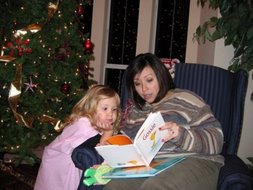Sones, Sonya. 2001. What my mother doesn't know. New York: Simon & Schuster Books for Young Readers.
Sonya Sones young adult novel What my Mother Doesn't Know is told in verse from the perspective of Sophie, a fourteen-year old girl struggling to understand her world while trying to find the right boyfriend. Through the verse, Sophie describes the challenges of deciphering her feelings for various boys. She also tries to understand her parents and the effect that their sour relationship has had on her mom. Finally, she speaks candidly about everyday things from dealing with your period to staring at your favorite painting in a museum. Sones propels the narrative forward through the free verse poems. The story consistently features realistic situations and characters that are recognizable. Sones' confessional style provides an intimate glimpse into Sohpie's thoughts and emotions.
Novels written in verse form are excellent tools for disinclined readers because of their brevity. At only 259 pages, most of the poems are one page long making this a quick read. Poetry is also the perfect vehicle for the emotional upheavals that often accompany teen lit. In this story Sophie falls in and out of love three times, describes the difficult relationship she witnesses between her parents, and gives a sense of her own challenging relationship with her mother. Each of these experiences carries heavy emotional impacts that can frankly be described through poetry. A perfect example of this is in the poem "All I Want to Know Is" where Sophie is describing the immediate aftermath of a fight with her mom. The numb tone of her mother's voice makes her feel incredibly guilty, but seconds after the fight when the phone rings, her mother answers it sounding as if nothing is wrong. The poem ends with Sophie enraged imagining herself attacking her mother physically, "…slapping her so hard/across her face/that the shape of my hand/will leave a stinging print?" (Sones 148). Despite the succinct style, the complexity of emotions is always evident.
The poetry in this story is accessible. It is as if overhearing a conversation or reading a teenagers personal diary. A few poems are e-mails from Sophie's friends. There are several pop culture references mainly to television shows like "The Twilight Zone" or "From Martha's Kitchen." Sophie is a smart girl and though she may be trying to make sense of her confused mental state, she does know when someone has crossed a line. She immediately ends the relationship with her cyber boyfriend, Chaz, when he makes a shocking confession. In the poem "Culture Clash," she describes an awkward moment with her first boyfriend Dylan. After he asks her not to mention to his mom that she is Jewish, she cunningly replies "okay, but can I/tell her about/the HIV positive thing?" (Sones 74). Sophie has a wile way about her. She is strong and eventually learns not to be afraid to do what you feel is right.
Because of the female protagonist and the introspective nature of the poems, this novel may appeal more to girls than boys. Sophie is the typical teenage girl that is angry at her parents, in love with lots of boys and unfalteringly loyal to her friends. Her wit shines through the poetry making the most mundane situations interesting. Sones' talent in keeping the narrative moving while getting to the essence of emotion makes this a worthwhile read.
Subscribe to:
Post Comments (Atom)

No comments:
Post a Comment